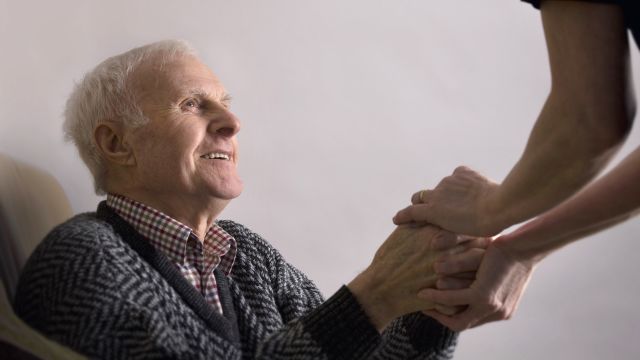Updated on January 29, 2024.
“Like so many caregivers, I arrived at my caregiving role accidentally,” says Shelley Webb, RN. Webb became a full-time family caregiver when she brought her 86-year-old father into her home. Expecting the independent father she’d always known, she was caught off guard by reality.
“I knew he was becoming forgetful, but I had no idea the extent of his ‘forgetfulness’ until he arrived on my doorstep,” says Webb. “He wasn’t even able to make his own coffee.” Five days after her father’s arrival, Webb found herself rearranging the kitchen so he could find the coffee pot, coffee cups, cream, and sugar.
Despite her many years of experience as a registered nurse, Webb had no idea what she was getting into.
She quickly discovered how stressful it was to care for a parent who needed extensive supervision to be safe. She tried to keep up her work as a hospital nurse but realized it was impossible when her father started calling the hospital operator and yelling at her to go find his daughter. Then one day Webb came home to discover her father had bought a new truck and had it delivered.
One of the biggest challenges, Webb says, was dealing with role reversal. Once her father had “all the answers,” but now Webb needed to make rules to keep her father safe. She was now the one arguing with her father to stop him from using a radial arm saw.
Webb also struggled with guilt when she had to leave her father at home when she attended events or activities that he couldn’t participate in. “After a while, you just give up on having a social life—and that’s where the loneliness and isolation comes in,” she says. There was also constant fear and self-doubt, which would come on when she felt overwhelmed by caregiving. “My father always said he was going to live to be 100,” Webb said. “I remember thinking, ‘I can't possibly do this for another 14 years.’ ”
Webb began writing in a journal and started a caregiving website as a way of finding community. Her hope has been to offer other caregivers the solace of knowing they’re not alone and permission to take care of themselves. “I always tell caregivers that a car can’t run on a gas tank that’s empty, and neither can a caregiver. You have to find ways to refill the tank.”
Webb’s father died in 2009. After his passing, Webb began to provide geriatric care management, case management, and health coaching services. “As caregivers, our goal is to make the final months or years of a loved one’s life as happy as possible. But a caregiver is not required to give up her own life in order to be a caregiver. There’s a fine line between guilt and regret but there is a line.”





